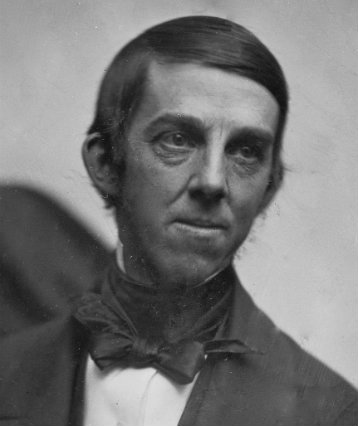Scarce could the parting ocean close,
Seamed by the Mayflower’s cleaving bow,
When o’er the rugged desert rose
The waves that tracked the Pilgrim’s plough.
Then sprang from many a rock-strewn field
The rippling grass, the nodding grain,
Such growths as English meadows yield
To scanty sun and frequent rain.
But when the fiery days were done,
And Autumn brought his purple haze,
Then, kindling in the slanted sun,
The hillsides gleamed with golden maize.
The food was scant, the fruits were few
A red-streak glistening here and there;
Perchance in statelier precincts grew
Some stern old Puritanic pear.
Austere in taste, and tough at core,
Its unrelenting bulk was shed,
To ripen in the Pilgrim’s store
When all the summer sweets were fled.
Such was his lot, to front the storm
With iron heart and marble brow,
Nor ripen till his earthly form
Was cast from life’s autumnal bough.
But ever on the bleakest rock
We bid the brightest beacon glow,
And still upon the thorniest stock
The sweetest roses love to blow.
So on our rude and wintry soil
We feed the kindling flame of art,
And steal the tropic’s blushing spoil
To bloom on Nature’s ice-clad heart.
See how the softening Mother’s breast
Warms to her children’s patient wiles,
Her lips by loving Labor pressed
Break in a thousand dimpling smiles,
From when the flushing bud of June
Dawns with its first auroral hue,
Till shines the rounded harvest-moon,
And velvet dahlias drink the dew.
Nor these the only gifts she brings;
Look where the laboring orchard groans,
And yields its beryl-threaded strings
For chestnut burs and hemlock cones.
Dear though the shadowy maple be,
And dearer still the whispering pine,
Dearest yon russet-laden tree
Browned by the heavy rubbing kine!1
There childhood flung its rustling stone,
There venturous boyhood learned to climb,—
How well the early graft was known
Whose fruit was ripe ere harvest-time!
Nor be the Fleming’s pride forgot,
With swinging drops and drooping bells,
Freckled and splashed with streak and spot,
On the warm-breasted, sloping swells;
Nor Persia’s painted garden-queen,—
Frail Houri2 of the trellised wall,—
Her deep-cleft bosom scarfed with green,—
Fairest to see, and first to fall.
When man provoked his mortal doom,
And Eden trembled as he fell,
When blossoms sighed their last perfume,
And branches waved their long farewell,
One sucker crept beneath the gate,
One seed was wafted o’er the wall,
One bough sustained his trembling weight;
These left the garden,—these were all.
And far o’er many a distant zone
These wrecks of Eden still are flung
The fruits that Paradise hath known
Are still in earthly gardens hung.
Yes, by our own unstoried stream
The pink-white apple-blossoms burst
That saw the young Euphrates gleam,—
That Gihon’s3 circling waters nursed.
For us the ambrosial pear—displays
The wealth its arching branches hold,
Bathed by a hundred summery days
In floods of mingling fire and gold.
And here, where beauty’s cheek of flame
With morning’s earliest beam is fed,
The sunset-painted peach may claim
To rival its celestial red.
What though in some unmoistened vale
The summer leaf grow brown and sere,
Say, shall our star of promise fail
That circles half the rolling sphere,
From beaches salt with bitter spray,
O’er prairies green with softest rain,
And ridges bright with evening’s ray,
To rocks that shade the stormless main?
If by our slender-threaded streams
The blade and leaf and blossom die,
If, drained by noontide’s parching beams,
The milky veins of Nature dry,
See, with her swelling bosom bare,
Yon wild-eyed Sister in the West,—
The ring of Empire round her hair,
The Indian’s wampum on her breast!
We saw the August sun descend,
Day after day, with blood-red stain,
And the blue mountains dimly blend
With smoke-wreaths from the burning plain;
Beneath the hot Sirocco’s4 wings
We sat and told the withering hours,
Till Heaven unsealed its hoarded springs,
And bade them leap in flashing showers.
Yet in our Ishmael’s thirst we knew
The mercy of the Sovereign hand
Would pour the fountain’s quickening dew
To feed some harvest of the land.
No flaming swords of wrath surround
Our second Garden of the Blest;
It spreads beyond its rocky bound,
It climbs Nevada’s glittering crest.
God keep the tempter from its gate!
God shield the children, lest they fall
From their stern fathers’ free estate,—
Till Ocean is its only wall!
2
One of the beautiful maidens that in Muslim belief live with the blessed in paradise. Return to text.
3
The second river mentioned in the second chapter of the biblical Book of Genesis. Return to text.
4
A Mediterranean wind that comes from the Sahara and reaches hurricane speeds in North Africa and Southern Europe. Return to text.
Return to The Meaning of Independence Day.




Post a Comment